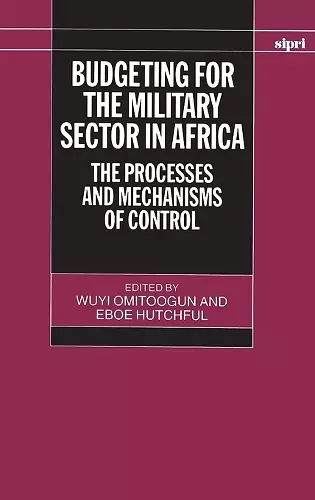Budgeting for the Military Sector in Africa
The Processes and Mechanisms of Control
Wuyi Omitoogun editor Eboe Hutchful editor
Format:Hardback
Publisher:Oxford University Press
Published:16th Mar '06
Currently unavailable, and unfortunately no date known when it will be back

In this comprehensive study, 12 experts describe and analyse the military budgetary processes and degree of oversight and control in eight African countries-Ethiopia, Ghana, Kenya, Mali, Mozambique, Nigeria, Sierra Leone and South Africa-spanning the continent's sub-regions. Each country study addresses a wide range of questions, such as the roles of the finance and defence ministries, budget offices, audit departments and external actors in the military budgetary processes; the extent of compliance with standard public expenditure management procedures; and how well official military expenditure figures reflect the true economic resources devoted to military activities in these countries. The framework for the country studies is provided by a detailed model for good practice in budgeting for the military sector. The individual studies are tied together by a synthesis chapter, which provides a comparative analysis of the studies, classifies the eight countries according to their adherence to the principles of public expenditure management and explains why individual countries find themselves with a certain classification. The book draws on the results of the country studies and their analysis by making concrete recommendations to the governments of African countries and the international community. While the military sector in many African states is believed to be favoured in terms of resource allocation and degree of political autonomy, it is not subject to the same rules and procedures as other sectors. Because of the unique role of the armed forces as the guarantor of national security, and their demand for a high degree of confidentiality in certain activities, the military sector receives a significant proportion of state resources and is not subject to public scrutiny. The book argues that while the military sector requires some confidentiality it should be subject to the same standard procedures and rules followed by other state sectors.
ISBN: 9780199262663
Dimensions: 240mm x 162mm x 22mm
Weight: 616g
312 pages